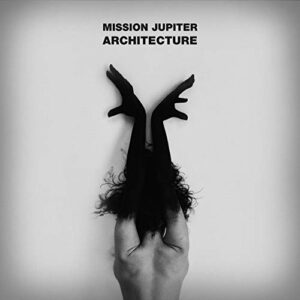It seems that, in the last year or so, there’s been a concerted effort from some areas of the metal and hard rock world to edge into pop territory. Results have been variable, with the latest effort from Bring Me The Horizon arguably proving the most successful thanks to that band’s appreciation of the form. Such high-profile efforts notwithstanding, endeavouring to bridge the mainstream and underground has been a speciality of the Epitronic label since its inception. A perfect example of this is the band Mission Jupiter, whose Architecture album appeared on the label last year. Nominally, you could argue that the band’s most obvious antecedent would be evanescence, but dig beneath the surface and you’ll find elements of Depeche Mode, Paradise Lost, hints of jazz and more. The result is a boldly exploratory album that puts recent efforts by the likes of Within Temptation and Shinedown firmly in their place. In a just world, this would be the mainstream.
Opening with echoing piano and eerie signals, the dawn is little more than a scene setter, introducing the band’s dense, electronically-augmented sound. The production, handled by the band themselves, is exquisite. It’s clear that Eugene Zuyeu (drums, keyboards and programming) knows his way around the mixing desk and he uses his undoubted skills to give his band a sound worthy of the largest Hollywood studios. We also get a hint of Nastia Shevtsova’s vocal strengths as she croons gently over the banks of synth, although we are not formally introduced until I have to know, a soaringly ambitious pop song that harks back to the mid-eighties when pop bands from Simple Minds to Madonna straddled the globe whilst playing their own instruments – a concept of which the current crop of auto-tuned, studio hacks seem to be entirely unaware. However, as melodic as the track gets, there’s still plenty of chunky guitar (Vladimir Shvakel) for rock fans to get their teeth into, and, as the album flows into Either dream or not, you start to realise that the band aren’t going to make it quite that easy again. A gorgeous piece of ethereal dark-pop, the sparse arrangement of the verse shines a blazing light on Nastia’s vocal and she rises admirably to the challenge, delivering a performance that sits just on the right side of vulnerable as the band conjure up soundscapes that sound like latter-day Depeche Mode going head-to-head with dubstar. It’s a brilliant track and it really draws the listener deeper into the album. Will you be loved starts out as a subtle, acoustic lament that recalls Anathema’s gorgeous hindsight album, only with a greater emphasis on atmospheric synths, only for the band to suddenly throw a sax part into the mix. It’s the sort of bold stylistic addition that shouldn’t work, and yet does, perfectly. Keeping ambition to the fore, the band then unveil the stunning, two-part the sea of hopes. The first part is a taut rock track that sees electronic and acoustic percussion vie for attention as the guitars are ramped up in the mix, the band delivering a track that harks back to The Gathering’s majestic Mandylion album. The second part adds much darker layers of synth with glitched vocals and palm-muted guitars adding to the tension. It provides a short, fitting coda to the track Rightly placed at the heart of the album, the sea of hopes is a masterpiece that perfectly juxtaposes the gleaming lines and necessary melodicism of pop with the harsh edge of metal.
Opening the album’s second half, the smoky sound of the sax leads the jazz-infused darkwave of joy of life. Another track that, in a just world, would be tearing through the charts with its gorgeous vocal and exquisite musicianship, joy of life provides the perfect antidote to the claustrophobic synths of the sea of hopes pt. 2. In contrast, the airy I will survive suffers from a cliched concept, and is arguably the weakest track on the album, lacking the widescreen ambition seen elsewhere. However, it is followed by the dense, trippy interlude, which slowly swells out of the static to provide the perfect bridge to the call. A more ambient piece of music with heavily augmented drums and a lush, cinematic sweep to the reverb-drenched guitars, it is a piece heavy with emotion and pitched just right. The album closes with the urgent, synth-led instrumental impulse. An energetic piece of music, it blazes past in a mere two minutes, allowing the curtain to fall on a record to which you’ll be eager to return.
With the worlds of pop and metal colliding in so spectacular a fashion, 2019 could easily be the year of Mission Jupiter and deservedly so. The album oozes class, with fantastic production, tightly edited songs and a sense of progression through the record that keeps the listener hooked to the end. An absolute treasure, architecture has it all: dreamy ethereal pop, dark, stuttering synths and taut, razor-sharp riffing and their next effort cannot come soon enough. 9




